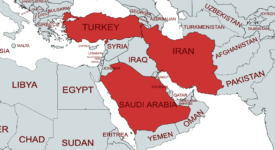The tension between Iran and the US, as well as between Iran and Saudi Arabia, is reaching the new critical highs, which could lead to some possible confrontations among these parties. Nearly two years after it entered into force, the 2015 Joint Comprehensive Plan of Action (JCPOA) between Iran and the P5+1 (permanent members of the Security Council plus Germany) is in jeopardy. The atmosphere in the Middle East is also heading in unwanted directions. Frictions between Iran and the US are growing in Iraq and Syria, as the strength of their common foe, the Islamic State (ISIS), diminishes.
Escalation on one front could start a chain reaction as the US efforts to undermine the JCPOA could prompt Iran to respond asymmetrically by targeting US forces in Iraq or Syria. This chain reaction could very well spread to a wider scale, which could have catastrophic consequences. It’s in the best interest of all the parties involved to tackle this issue, but there hasn’t yet been any sign of a diplomatic movement among these countries.
To understand the complex dynamics of this region and to alert officials and non-officials about potential inherent risks, the International Crisis Group has launched the Iran-US Trigger List. Its main goal is to propose concrete steps on how to mitigate conflicts and how to preserve peace in this region to avert the most dangerous outcomes. It is an interactive early-warning platform aimed at monitoring, analyzing and providing regular updates on the key and increasingly tense flashpoints between Iran and the US or between their respective allies.
Based on the evaluation of these developments, the likelihood of confrontation will be measured on a five-level, color-coded risk assessment: low, moderate, substantial, severe or critical. The list also identifies opportunities stemming from potential positive developments in these various areas, such as a prisoner release, a ceasefire agreement in Syria or Yemen, or a high-level meeting between Iranian and US officials.
Measuring the likelihood of a confrontation is not an exact science. On the one hand, there is an apparent collective reluctance to go to war, but on the other, there is a potential for miscalculation if any kind of dialogue or diplomacy is absent. The main objective of this list is to neither underplay nor overestimate the risks of conflict. Some potential flashpoints – such as the re-imposition of US sanctions; a successful Huthi missile strike on a Saudi or Emirati city; a US attack on an Islamic Revolutionary Guards facility in Iran; an Iraqi Shiite militia targeting of a US soldier; or an Israeli pre-emptive attack against Hizbollah – are more likely than others to escalate and destabilize the region.
That said, as Crisis Group Middle East and North Africa Program Director Joost Hiltermann has written, “conflicts’ long-term trends (‘causes’) are often clear enough, but not the proximate causes, or triggers. What precipitates a conflict may be a sudden, unforeseen event: an accident, misreading or miscalculation, or a temperamental leader’s flash of hubris”. As a result, the Trigger List does not only consist of long-term structural factors that create fertile ground for conflict, but also of more short-term, immediate triggers.
Armed with years of field research and a vast network in the region and beyond, Crisis Group analyzes both sets of factors and assesses other hard-to-predict actors. The Trigger List identifies concrete developments that make a crisis more or less likely, as well as assess political fault lines that may be aggravated as conditions on the ground shift, estimate how actions of various actors affect the likelihood of violent escalation, and provide suggestions on how to de-escalate tensions.
‘How Europe Can Save the Iran Nuclear Deal’ – Research Paper by ICG Research Team – International Crisis Group / ICG.
(The Research Paper can be downloaded here)







